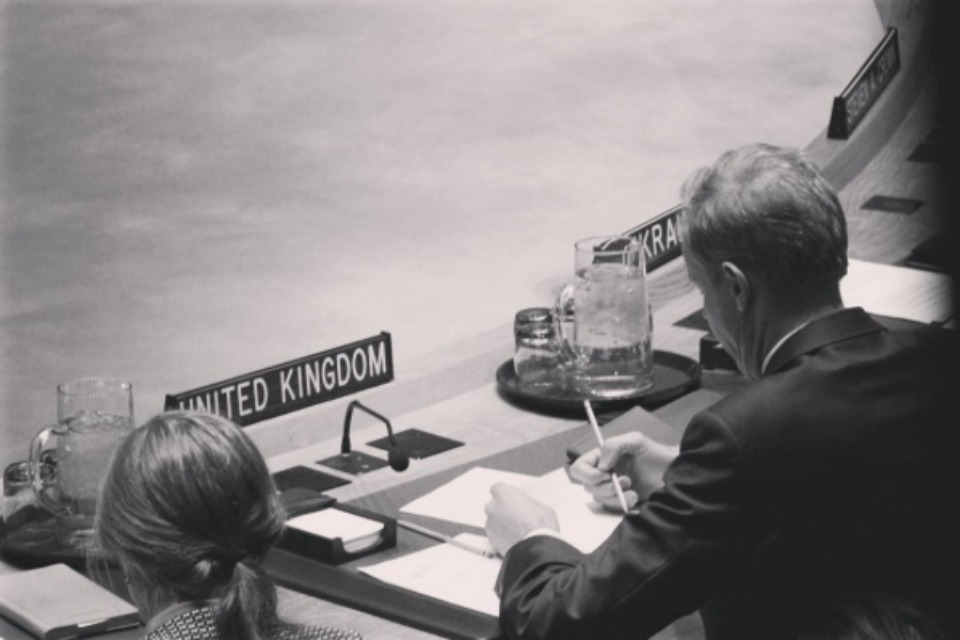“Thanks to the love of his family, he never made it to Syria.”
Statement by Ambassador Matthew Rycroft of the UK Mission to the UN at the Security Council Session on countering narratives and ideologies of terrorism

Thank you Mr President, and allow me at the outset to join you and others in expressing condolences to the families of all those killed in recent terrorist attacks. I also want to thank the Deputy Secretary-General and the Secretary General of the Al Azhar Islamic Research Academy for their briefings.
I often say that this Council needs to hear more frequently from those working on the front lines of the challenges that we face. And it is a sign of the sophistication of the threats that the internet is now one such front line. So I very much welcome you, Mr Crown, to the Council and pay tribute to the work that you do at the Global Network Initiative and all that it does to protect freedom of expression on the internet.
Microsoft is a brand that we all recognise, that we all understand. The same could be said of our brand, the United Nations, or the Security Council. But sadly, the same can also be said of Da’esh.
To the disaffected, the disillusioned and the vulnerable, the Da’esh brand has a terrifying ability to connect and persuade. It offers the false promise of empowerment, of identity, of belonging. It claims to offer a new society, one mandated through a perverse interpretation of one of the world’s great religions. It even has its own logo. The black flag is globally recognised; revered by the few, feared by the many.
The engine of this brand is without doubt the internet. It has been hijacked to spread the hateful messages of Da’esh in ways previously thought impossible, to reach audiences previously thought inaccessible. And this is true in my country as much as it is in any of the countries represented around this table.
Take the case of Ednane Mahmood, a student from Lancashire in the north of England. Through the internet, he was drawn to the Da’esh brand. He searched for graphic videos of Da’esh’s brutality and he shared them in an effort to indoctrinate others. The internet was just the start. Spurred on by what he had seen online, he sought it out in the real world and flew to Turkey in September 2014 to join Da’esh in Syria.
How can we respond to this horrific abuse of the internet? How can we show vulnerable people like Mr Mahmood that there is an alternative to the Da’esh brand?
Our approach in response needs to involve the whole of our societies. It’s not just about governments, it’s about harnessing the expertise of local communities, civil society, religious leaders. These groups bring credibility and authenticity that can counter the narratives of groups like Da’esh.
A whole-of-society approach also means partnerships with tech companies to help us reclaim the space Da’esh has occupied on social media. And to be clear, this doesn’t mean coercing or restricting tech companies. We can’t beat Da’esh by censoring or restricting access to social media. Instead we need to work together to amplify voices that can persuade and inform, and ultimately undermine the Da’esh brand. To defeat a network, we need a network.
The United Nations has a vital role to play in this effort. This organisation has a unique ability to convene interested parties, as you have done today Mr President. The United Nations has a unique ability to share emerging evidence of what works so that we can all learn from each others’ best practice. And it is the United Nation’s ability to build longer term resilience at sub-national, national and regional levels that will ensure that there is a long term solution to the threat posed by violent extremism.
That is why the United Kingdom firmly endorses the Secretary-General’s plan of action to prevent violent extremism. We call on all States to implement its vital recommendations, many of which bolster the objectives outlined in the Presidential Statement that we have adopted today.
Outside the UN, the United Kingdom will also play our part. As the co-chairs of the Global Coalition’s efforts to tackle Da’esh’s propaganda, we have invested over 14 million US dollars in the Coalition’s communications cell in London.
We’re not alone. Our partners from Bahrain, Canada, Denmark, Germany and the Netherlands are helping run the cell, and we are working extremely closely with the US and UAE. Together, we are taking the propaganda fight to Da’esh — and we know that it is working. Da’esh’s media output from Syria has dropped considerably. For every Da’esh supporter on twitter, we now see at least six twitter handles speaking out against them. Please join them and tweet about #DefeatingDaesh.
Mr President, In conclusion, we of course can’t be complacent. The challenge ahead still remains significant. But there are grounds for optimism. And to illustrate this, let me return to the story of Mr Mahmood. Thanks to the love of his family, he never made it to Syria. His brother used twitter to reach Ednane just before he crossed the border. He persuaded him to return to the UK, to take responsibility for his actions. His brother was that vital, credible voice needed to show Ednane that there was an alternative. And of course it was the internet that enabled him to do so. As we continue our fight against Daesh, I hope we can all have this story firmly in our minds. Thank you.